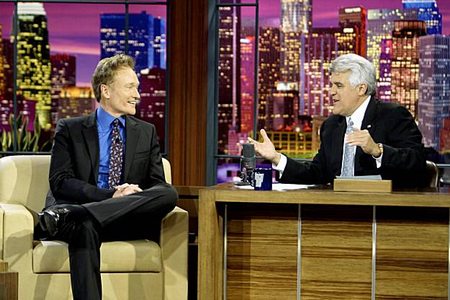Talking bout my generation
 Seeing the commercials for the ‘return of Jay Leno’ over the last couple of weeks has made me think…
Seeing the commercials for the ‘return of Jay Leno’ over the last couple of weeks has made me think…
Five years ago, NBC announced that half a decade later Conan would sit in Jay’s chair hosting the legacy Tonight Show. At the time I was impressed. Here was a network full of Baby Boomer executives that was actually doing some forward thinking regarding the upcoming generation. They were rightly concerned that a demographic sea change was on the horizon, and they were doing their best to get in front of it to ensure the continuance of current younger fan-base as well as to reach out to ones that didn’t yet exist.
Alas, it was all talk. Sure there was the actual switch, but you could tell that they were nervous from before it happened. Because they could not bring themselves to sell out to this generational transition, they hedged their bets and kept Jay on at 10— where nobody thought he would thrive, but where he was guaranteed to upstage the younger host. And they told Conan to change his presentation and personality so he could more respectfully reach the aging population who may not “get” him so much; in the process he lost the very thing that made him appeal to millions of younger viewers. Predictably NBC tanked in the ratings for both shows.
Now I don’t watch much late night TV anymore and I really don’t have anything invested in the goings-on at NBC. But, all week I have been wondering about the church leadership implications. In a time when denominational overseers talk a lot about restocking the shelves of pastoral leadership and reaching an emerging generation, I wonder if they are really committed to the follow-through without hedging their bets. I wonder if they are taking the long view and planning to place competent but younger pastors who can reenergize legacy churches to connect with an emerging generation. I wonder if they are willing to do this with the knowledge that if these new pastors are free to maintain their own personality and style, that they just might loose some of the older folks. And, I’ve wondered if successful pastors who have brought on younger leaders to wait in the wings for their retirement will ever truly be able to let go.
I’m not suggesting that the current aging generations (The Silent & Baby Boom Generations) are irrelevant and shouldn’t continue in leadership. Neither am I contending for younger pastors to irresponsibly alienate our valued elders. I am questioning whether, as humans get older, we have an inordinate need to go back to the way it was, while not investing everything in the way it will need to be—more than anything I question if we unconsciously but instinctively neglect the next generation of lost people in our most important leadership decisions.
I hope that I remember these lessons in 25 years when I am at retirement age. And I pray that I take a note from the life of Moses who was told to “commission Joshua and encourage and strengthen him, for he will lead this people across and will cause them to inherit the land that you will see” (Deuteronomy 3:28).
